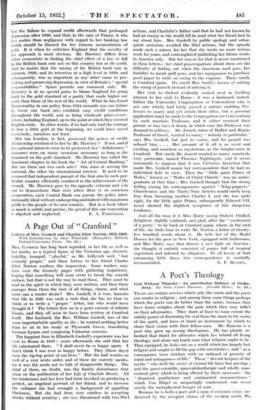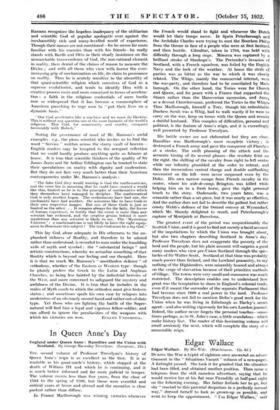A Poet's Theology
God Without Thunder : An unorthodox Defence of Ortho- doxy. By John Crowe Ransom. (Gerald Howe. 4s. Od.) THERE are certain services which only the saints and the poets can render to religion : and among these some things perhaps which the poets can do better than the saints, because they have fewer scruples about the pain which they may inflict on their adversaries. They share at least to some extent the saintly poWer of discerning the real from the sham in the realm of the spirit, and have at hand an instrument by which to share their vision with their fellow-men. Mr. Ransom is a poet who grew up among theologians. He has plainly in- herited that thirst for ultimates which lies behind all living theology, and alone can teach man what religion ought to be. Thus equipped, he looks out on a world which has largely lost religion and sought to fill the gap with substitutes ; and " as a Consequence been stricken with an unheard of poverty of mind and unhappiness of life." Those " devout keepers of the myths " who held the secret of eternal life have lost prestige ; and the quasi-scientific, quasi-philanthropic and wholly man- centred piety which is being offered by their successors---the " disguised pantheisms and sentimental immanentisms " which Von Hugel so unsparingly condemned--can never satisfy the metaphyiical hunger of man.
Because he is both a poet and a man of common sense, un- deceived by the 'arrogant claims of the uaslem mind,
Ransom recognizes the hopeless inadequacy of the utilitarian and scientific God of popular apologetic over against the inexhaustibly rich and many-levelled world of experience. Though their names are not mentioned—for he seems far more familiar with his enemies than with his friends—he really stands with Barth and Otto in their steady insistence on the unsearchable transcendence of God, the non-rational element in reality, their denial of the claims of reason to measure the Divine ; and with all those who view with horror the ever- increasing grip of mechanization on life, its claim to pronounce on reality. Thus he is acutely sensitive to the absurdity of that quasi-scientific religion which conceives of God as a supreme evolutionist, and tends to identify Him with a creative process more and more conceived in terms of accelera- tion : a faith in the religious credentials of mere bustle now so widespread that it has become a commonplace of American preaching to urge men to " put their lives on a dynamic basis."
" Our God accelerates like a machine and we must do likewise_ This is without, any question one of the most fantastic of the world's religions. This God, for monstrosity and cruelty, compares favourably with Moloch."
Noting the provenance of most of Mr. Ransom's awful examples—e.g., the pious scientist who invites us to find the word " Service " written across the starry vault of heaven—
English readers may be tempted to the arrogant reflection that we could hardly produce anything quite so fatuous at home. It is true that scientific thinkers of the quality of Sir James Jeans and Sir Arthur Eddington can be trusted to state their speculations on reality with dignity and moderation.
But they dO not fare very much better than their American contemporaries under Mr. Ransom's analysis :
" The false God they would worship is God the mathematician, and the error lies in assuming that he could have created a world like this, limited as he is to the principles of mathematics which they themselves have managed to decipher. The mathematical Clod is only another Logos. The evolutionists have had one, the Mechanists have had another; the scientists like to have Gods in their own respective images. But one of these Gods is just as
limited as the other. It remains always for the laity, the lovers of human experience, to testify that the event is more than any scientist has reckoned, and the creative genius behind it more mysterious than any scientist is likely to see. The `Mysterious Universe ' : a mathematician is not likely to have the right equip- ment to illuminate this subject ! The true God must be a lay God."
This lay God, alone adequate in His otherness to the un- plumbed richness of Reality, and therefore to be adored rather than understood, is revealed to man under the humbling veils of myth and symbol : the " substantial beings " and artistic constructions, whereby we actualize something of that Reality which is beyond our feeling and our thought. Here it is that we reach Mr. Ransom's " unorthodox defence " of orthodoxy, whether of the Eastern or Western type—though he plainly prefers the Greek to the Latin and Anglican Churches, as being less tainted by the industrial heresies of the West, and more concerned to safeguard the mystery and awfulness of the Divine. • It is true that he includes in the realm of Myth much to which the orthodox must give historic status ; and sometimes spoils his own case by relapses into modernism of an obviously second-hand and rather out-of-date type. Yet. those who are fighting the battle of the Super- natural will find him a loyal and vigorous fellow-soldier, and can afford to ignore the peculiarities of the weapons with



























































 Previous page
Previous page